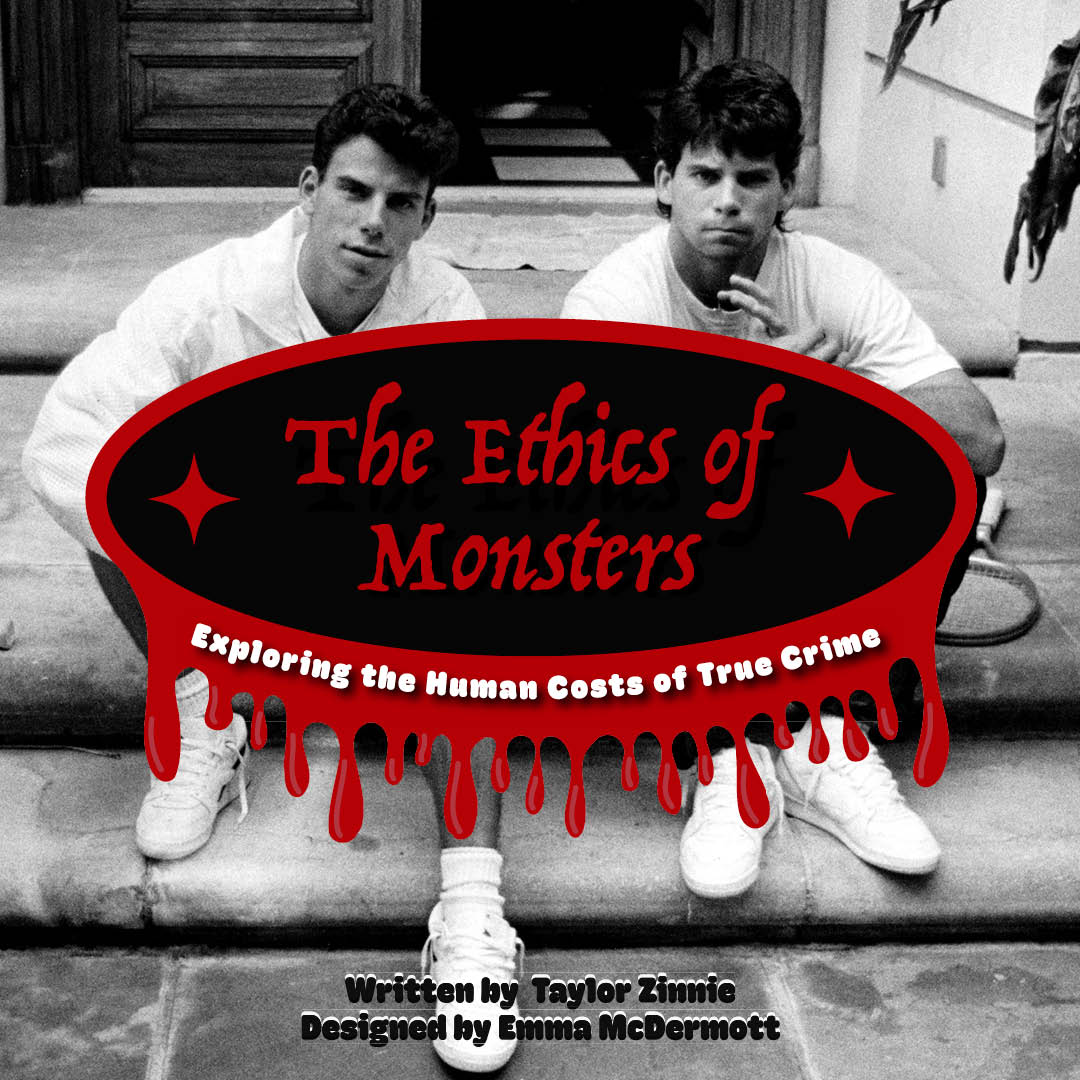
True crime sells. Society has been consuming chilling stories of gruesome acts for centuries, captivated by the darkest sides of humanity. In recent years, the true crime genre has exploded into a multimillion-dollar empire, with an endless array of podcasts, documentaries and TV series to satisfy our fascination with the unthinkable. However, as the popularity of this industry continues to grow, questions surrounding how ethical it is in nature have arisen.
Since its release on Sept. 19, “Monsters: The Lyle and Erik Menendez Story” has dominated headlines, debuting as the top series on Netflix worldwide. The docuseries has reignited public interest in the Menendez brothers, who murdered their parents in 1989, allegedly acting in self-defense following years of abuse. “Monsters” is the second season of Ryan Murphy’s larger anthology series that centers on convicted murderers. The first season, released in 2022, dramatized the life and acts of Jeffrey Dahmer, a notorious cannibalistic serial killer.
Like the preceding season, “Monsters” recounts the experiences of Lyle and Erik Menendez, played by Nicholas Alexander Chavez and Cooper Koch, in evocative detail. The series does not shy away from the sensitive nature of the circumstances surrounding the crime, portraying the regular sexual abuse the brothers endured from their father as well as the humiliation their mother subjected them to.
While producer Ryan Murphy claimed that his project is “the best thing that has happened to the Menendez brothers in 30 years,” “Monsters” has received an onslaught of criticism, most notably from those at the heart of the story. Erik Menendez, who is still serving a life sentence, spoke out about the series using his wife’s X account. He expressed his disapproval concerning the “horrible and blatant lies” within the show, even suggesting that the portrayal set back progress made in recognizing male victims of sexual abuse. “I believe Ryan Murphy cannot be this naïve and inaccurate about the facts of our lives so as to do this without bad intent,” the statement read.
These sentiments were echoed by the family of the Menendez brothers. A letter written by Joan VanderMolen, their aunt, criticized “Monsters” and Murphy on behalf of 24 members of their extended family. The statement described the series as “a phobic, gross, anachronistic, serial episodic nightmare,” adding that the family was never consulted during the creation of the “grotesque shockadrama.”
The displeasure expressed by Erik Menendez and his family highlights several ethical issues that plague the true crime genre. Concerns about inaccuracy, insensitivity, misrepresentation and the retraumatization of those directly involved beg questions about where the line between well-intentioned and exploitative media lies.
Simply put, to produce true crime media is to profit off of tragedy. Of course, fascination and curiosity about such sensationalized cases are understandable, but the ethical responsibility lies in balancing the public’s curiosity with respect for those impacted.
At the center of every new true crime special are real people. Those involved are not just characters in a show; they are friends, families and individuals whose pain is immortalized on screen forever. When no effort is made to prioritize those who do not have the luxury of experiencing these cases from a distance, it is natural to wonder if creators are merely looking to make a profit.
When executed thoughtfully, true crime media can promote awareness and accountability, making space for important discussions. In some instances, crime content can impact real cases, helping to right wrongs made within the justice system. The 2014 investigative podcast “Serial” was instrumental in casting doubt on the homicide conviction of Adnan Syed. The podcast revisited the 1999 murder of Hae Min Lee, thoroughly exploring the details of the case and highlighting critical errors within the narrative presented by the prosecution. “Serial” is credited with reigniting interest in Syed’s case, which largely contributed to the decision to drop all charges against him, allowing him to walk as a free man in 2022. Even when crime media is not directly challenging injustices within the legal system, it can still be beneficial and educational, as many viewers look to true crime content for tips on avoiding victimization.
A stronger emphasis needs to be placed on ethical reporting over sensationalization to garner viewership. This entails obtaining informed consent from those portrayed and those affected by the story being depicted. Unfortunately, this is not typically the case, as displayed by “Monsters.” As the distinction between entertainment and reality continues to blur, media executives must approach the true crime genre with sensitivity, uplifting voices that deserve to be heard and prioritizing respect.